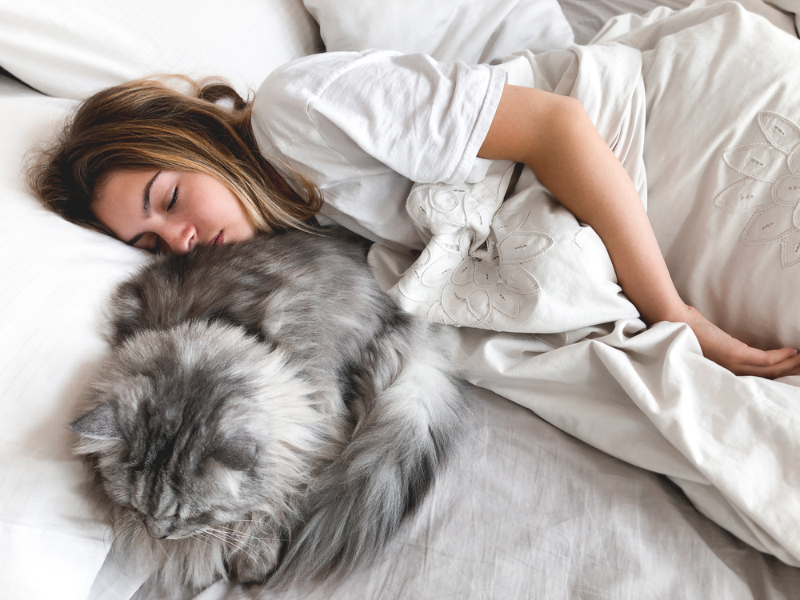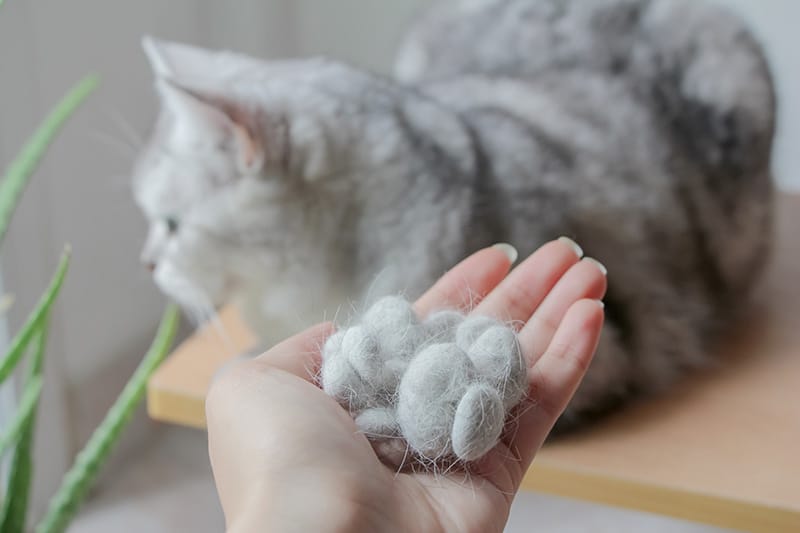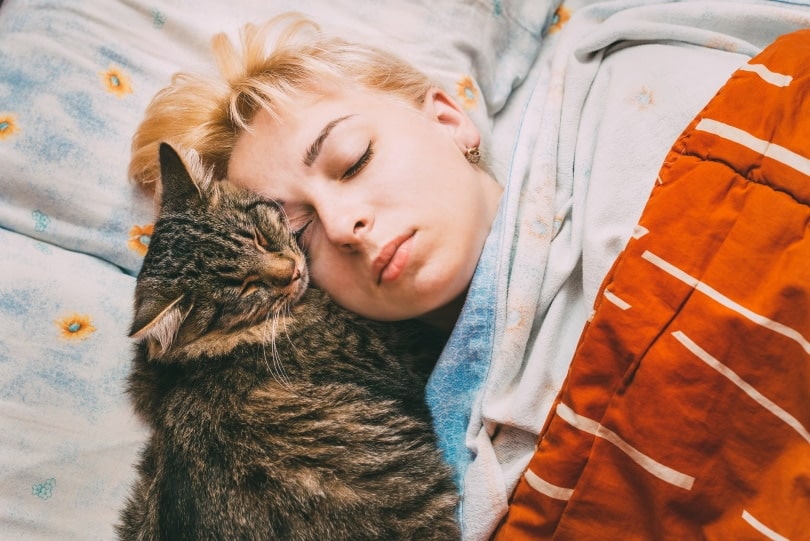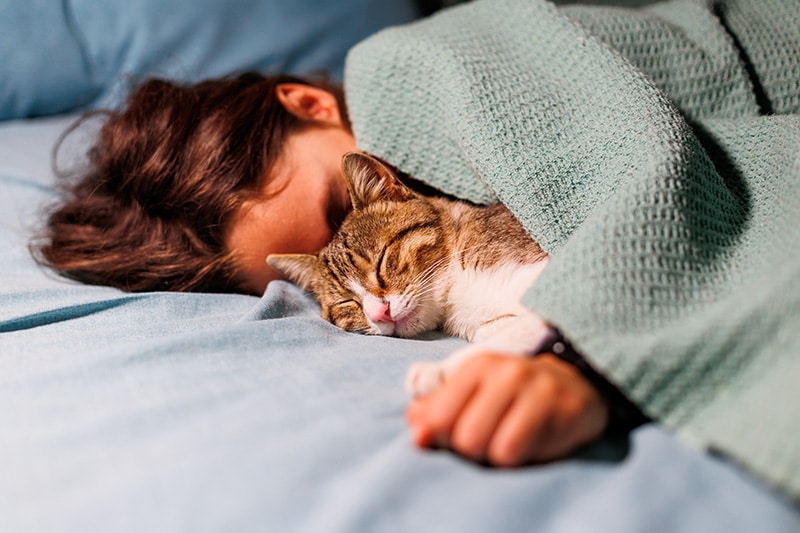Having cats sleep on their owners’ beds is an ongoing debate. There are some benefits to having your bed sleep on your bed with you at night, but there are some potential risks as well. When it comes to whether it’s right or wrong to have your cat sleep on your bed, it really depends on your unique situation. In some cases, it’s perfectly fine, while some people and cats will be better off sleeping on separate beds.
If you’re unsure if your cat should sleep on your bed, make sure to weigh the pros and cons before turning this into a nightly habit. Here are some things to consider before making your decision.
Pros of Letting Your Cat Sleep With You
1. Improves Mood
Having a cat comes with therapeutic benefits that can boost your mental health. Cats are capable of sharing strong bonds with humans, and they can help improve people’s emotional well-being. Some studies suggest that a cat’s purring may help lower blood pressure, lessen stress, and promote healing. Simply petting a cat can also decrease stress. So, cuddling with your cat before bedtime may help you to relax and have an easier time falling asleep.

2. Warmth
Your body temperature naturally drops at night while you’re sleeping. So, if you tend to get cold easily, it can be beneficial to have your cat sleep near you. Cats are heat seekers and like warm and cozy spaces. So, you can both benefit from having your cat sleep on your bed. You may also have an easier time falling asleep when you feel the comforting warmth of your cat.
3. Bonding Experience
Spending time with your cat helps to strengthen your bond. Over time, some cats may choose to start sleeping near their owners when they’ve built enough trust. This behavior is a sign of trust and affection, and it often means that your cat sees you as a safe and trustworthy person in their life. So, if they choose to sleep on your bed, it may be because they want to be near you and spend more time with you.

4. Quieter Sleep
Kittens and young cats may have active night lives that can cause disruptive sleep. Allowing your cat to sleep on your bed may encourage them to sleep around the same time you do. They can eventually adopt this nighttime routine and become less disruptive at night. Consider keeping your bedroom door closed at night to prevent your cat from wandering out and getting themselves into trouble.
5. Creates Structure
Cats are creatures of habit that thrive on a daily routine. Predictability and consistency help them to feel taken care of and safe, as they don’t need to worry about what happens next. So, establishing a bedtime routine with your cat sleeping on your bed can end up benefiting their entire well-being. They can get better rest and may sleep through the night more consistently.

Cons of Letting Your Cat Sleep With You
6. Increased Amounts of Cat Hair on the Bed
One of the disadvantages of having your cat sleep on your bed is uncleanliness. You’ll be sure to see an increase in cat hair on your bed. Allergy sufferers will also struggle with having their cats sleep on their beds because of the increased amount of pet dander and dust that will get on them.
In some cases, you may also see an increase in litter box tracking on your bed. If you plan to have your cat sleep on your bed, be prepared to make some adjustments so that you have a consistently clean sleeping area.

7. Frequently Changing Out Bed Sheets
Since there’ll be an increase in cat hair, dander, and other debris when your cat sleeps on your bed, you’ll have to change out your bed sheets more frequently. It’s best to have two or three sets of bed sheets in your rotation and to wash them weekly. You’ll also want to keep a spare set in case of accidents, like hairballs, vomit, and bathroom accidents.
8. Potential Danger for Cats
Sharing the same bed can be a potential danger for your cat if you tend to move around a lot in your sleep. If you have a history of moving around in your sleep, you may accidentally hurt your cat by hitting them or rolling on top of them.
Since it can be unsafe for some cats, it’s important never to force them to sleep on your bed. They’ll feel safer and appreciate it much more if they’re given a choice.

9. Interrupted Sleep
While cats may be able to help you feel more relaxed, they can also end up interrupting your sleep, especially if you’re a light sleeper. Kittens and younger cats can have a lot of energy and end up being very active at night. It’s not uncommon for them to try to wake up their owners or step on them while they’re sleeping. In some cases, cats may not really have an interest in sleeping on your bed at night until they’re older and have less energy.
10. Too Much Body Heat
If you tend to get hot easily, you may not appreciate having your cat sleep on your bed. However, you can do some things, such as using thinner blankets or cooling pillows to help you get better sleep at night.
Some cats may also just prefer sleeping on your bed but not near you. So, this isn’t really an issue unless your cat’s a cuddler or heat seeker and tries to sleep on top of you or next to you.
Conclusion
Overall, letting your cat sleep on your bed will depend on both you and your cat’s sleeping habits and preferences. Some people and their cats have compatible sleeping habits, while others don’t, and this doesn’t mean that they share an unhealthy relationship.
Keep in mind that cats are creatures of habit, and it can be difficult to break or change a bedtime routine once it’s been established. So, make sure to take some time to think if this will benefit you both before you decide on letting your cat onto your bed.
Featured Image Credit: zhukovvvlad, Shutterstock










